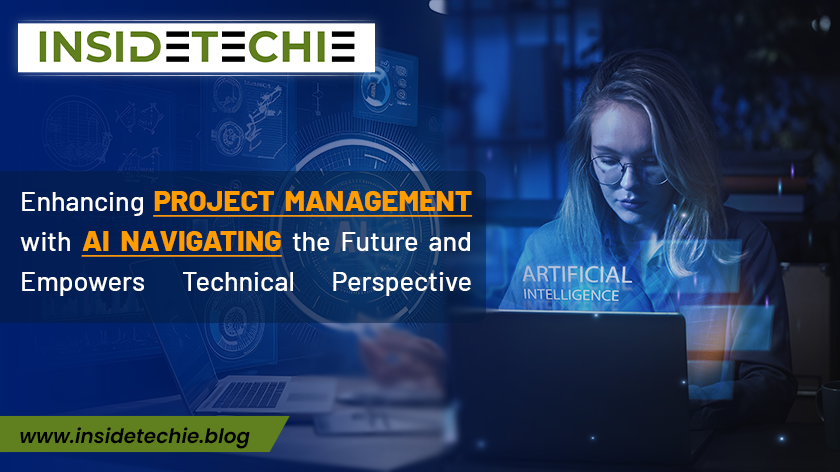Technical Project Managers (TPMs) are responsible for guiding complicated efforts toward success in the ever-changing field of project management, amidst paradigm shifts and technical developments. Artificial Intelligence (AI) becomes a potent ally in this ever-changing environment, providing a multitude of tools and capacities to enhance TPMs’ knowledge. In this blog, we’ll take a closer look at how artificial intelligence (AI) is changing the role of project managers (TPMs). We’ll also investigate the advantages, drawbacks, and practical uses of AI while considering its current trend in project management.
Unleashing the Power of AI in Project Management
At its core, AI is more than just a buzzword; it’s a paradigm shift in how we approach problem-solving and decision-making. For TPMs, AI serves as a force multiplier, enhancing efficiency, fostering innovation, and unlocking new avenues for success. Let’s delve into the multifaceted ways AI empowers TPMs:
1. Enhanced Decision-Making: AI-driven analytics and predictive modeling equip TPMs with actionable insights derived from vast datasets, enabling informed decision-making and risk mitigation strategies.
2. Optimized Resource Allocation: AI algorithms analyze resource utilization patterns, team capacities, and project requirements to optimize resource allocation, ensuring optimal efficiency and cost-effectiveness.
3. Streamlined Task Management: AI-powered task prioritization tools help TPMs streamline workflows, identify critical path tasks, and allocate resources effectively, thereby accelerating project timelines and minimizing bottlenecks.
4. Facilitated Communication and Collaboration: AI-driven communication platforms facilitate seamless collaboration among project teams, leveraging natural language processing (NLP) and sentiment analysis to enhance communication efficiency and foster teamwork.
5. Continuous Improvement: AI-powered analytics enable TPMs to glean valuable insights from project performance metrics, driving continuous improvement and refinement of project strategies and processes.
Benefits and Advantages of AI for TPMs
The integration of AI into project management yields a plethora of benefits that resonate throughout the project lifecycle:
– Efficiency Gains: AI automates repetitive tasks, freeing up time for TPMs to focus on strategic decision-making and value-added activities.
– Risk Mitigation: AI-powered analytics enable proactive risk identification and mitigation, reducing the likelihood of project delays or failures.
– Cost Savings: Optimized resource allocation and streamlined processes result in cost savings, maximizing ROI for organizations.
– Scalability: AI-driven tools are inherently scalable and capable of adapting to the evolving needs of projects of varying complexity and scope.
Challenges and Considerations
Despite its immense potential, AI implementation in project management is not without its challenges:
– Data Quality: AI relies heavily on the quality and availability of data, posing challenges in environments with sparse or inconsistent data sources.
– Change Management: Introducing AI-driven tools requires organizational buy-in and cultural shifts, necessitating change management strategies to ensure successful adoption.
– Ethical Considerations: AI algorithms must be designed and deployed ethically, mitigating biases and ensuring fairness and transparency in decision-making processes.
Case Study: AI in Action
Let’s consider a real-world example of AI’s impact on project management:
Case Study: Optimizing Software Development with AI
A software development company adopts AI-powered project management tools to streamline its development processes. By leveraging AI-driven analytics, the TPM gains insights into coding trends, identifies potential bottlenecks, and allocates resources strategically. As a result, the company experiences a 20% reduction in development time, a 15% increase in productivity, and a 10% improvement in client satisfaction scores.
Where Can We Use AI in Project Management?
The application of AI in project management spans across various industries and domains, including:
– Software Development: Optimizing development processes, identifying bugs, and enhancing code quality.
– Construction: Predictive analytics for resource allocation, risk management, and scheduling optimization.
– Healthcare: Streamlining clinical trials, optimizing resource allocation in healthcare facilities, and enhancing patient care delivery.
Is AI Trending in Project Management?
Without a doubt, AI is a trendsetter in the realm of project management, with organizations increasingly recognizing its transformative potential. According to industry reports, the global AI in project management market is poised for significant growth in the coming years, driven by advancements in AI technologies and increasing demand for efficiency and innovation in project execution.
Conclusion: Embracing the AI Revolution
The mutually beneficial relationship between AI and project management is becoming more and more evident as we move across the digital frontier. Adopting AI is not just a choice for TPMs; it’s a strategic need for remaining competitive in a world that is changing quickly. TPMs can drive operational excellence, confidently negotiate complicated situations, and successfully navigate the digital age by utilizing AI. Together, let’s go out on this revolutionary adventure to fully utilize AI in project management.
Are you ready to unlock the power of AI in project management? I’m part of the XcelTec team. The XcelTec team is here to help you innovate! Schedule a consultation today, and let’s explore how AI can revolutionize your approach. Connect with us now!
Visit Us now: https://www.xceltec.com/
 :
https://www.xceltec.com/
:
https://www.xceltec.com/

